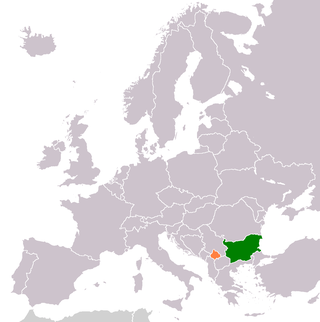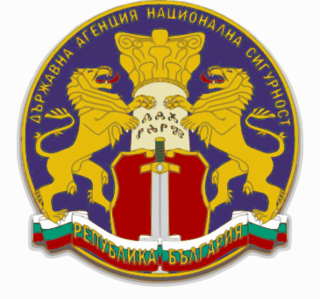| |||||
| Decades: | |||||
|---|---|---|---|---|---|
| See also: | |||||
Events in the year 2004 in Bulgaria .
| |||||
| Decades: | |||||
|---|---|---|---|---|---|
| See also: | |||||
Events in the year 2004 in Bulgaria .

The Balkans, also known as the Balkan Peninsula, is a geographical area in southeastern Europe with various geographical and historical definitions. The region takes its name from the Balkan Mountains that stretch throughout the whole of Bulgaria. The Balkan Peninsula is bordered by the Adriatic Sea in the northwest, the Ionian Sea in the southwest, the Aegean Sea in the south, the Turkish straits in the east, and the Black Sea in the northeast. The northern border of the peninsula is variously defined. The highest point of the Balkans is Musala, 2,925 metres (9,596 ft), in the Rila mountain range, Bulgaria.

The North Atlantic Treaty Organization, also called the North Atlantic Alliance, is an intergovernmental military alliance between 31 member states – 29 European and two North American. Established in the aftermath of World War II, the organization implemented the North Atlantic Treaty, signed in Washington, D.C., on 4 April 1949. NATO is a collective security system: its independent member states agree to defend each other against attacks by third parties. During the Cold War, NATO operated as a check on the threat posed by the Soviet Union. The alliance remained in place after the dissolution of the Soviet Union and the Warsaw Pact, and has been involved in military operations in the Balkans, the Middle East, South Asia, and Africa. The organization's motto is animus in consulendo liber.

The Warsaw Pact (WP), formally the Treaty of Friendship, Cooperation and Mutual Assistance (TFCMA), was a collective defense treaty signed in Warsaw, Poland, between the Soviet Union and seven other Eastern Bloc socialist republics of Central and Eastern Europe in May 1955, during the Cold War. The term "Warsaw Pact" commonly refers to both the treaty itself and its resultant defensive alliance, the Warsaw Treaty Organization (WTO). The Warsaw Pact was the military and economy complement to the Council for Mutual Economic Assistance (Comecon), the regional economic organization for the Eastern Bloc states of Central and Eastern Europe.

Belgium is a country in Europe and member of major international organizations like the European Union and NATO which are both headquartered in Brussels, Belgium.

The Stabilisation Force (SFOR) was a NATO-led multinational peacekeeping force deployed to Bosnia and Herzegovina after the Bosnian War. Although SFOR was led by NATO, several non-NATO countries contributed troops. It was replaced by EUFOR Althea in December 2004.

The Vilnius Group was an organization of NATO aspirant countries, created in May 2000, aimed at practical cooperation, exchange of information and lobbying for their candidacy in the NATO capitals.
This table shows the ranks and insignia of NCOs and Seaman in the navies of member countries of NATO. NATO maintains a "standard rank scale" in an attempt to match every member country's military rank to corresponding ranks used by the other members. The rank categories were established in the document STANAG 2116, formally titled NATO Codes for Grades of Military Personnel.

The Bulgarian Navy is the navy of the Republic of Bulgaria and forms part of the Bulgarian Armed Forces. It has been largely overlooked in the reforms that Bulgaria had to go through in order to comply with NATO standards, mostly because of the great expense involved and the fact that naval assaults are not considered to be a great concern for the country's security. That is why three of the four Romeo-class submarines are now docked and have been out of operation for some time. The last one was decommissioned in November 2011. Only the more modern frigates, corvettes and missile crafts are on active duty.

Lyubomir Ivanov is a Bulgarian scientist, non-governmental activist, and Antarctic explorer. He is a graduate of the St. Kliment Ohridski University of Sofia with M.S. degree in mathematics in 1977, earned his PhD from Sofia University in 1980 under the direction of Dimiter Skordev, with a dissertation titled Iterative Operative Spaces, and was the 1987 winner of Acad. Nikola Obreshkov Prize, the highest Bulgarian award in mathematics.

NATO is an international military alliance that consists of 31 member states from Europe and North America. It was established at the signing of the North Atlantic Treaty on 4 April 1949. Article 5 of the treaty states that if an armed attack occurs against one of the member states, it shall be considered an attack against all members, and other members shall assist the attacked member, with armed forces if necessary. Article 6 of the treaty limits the scope of Article 5 to the islands north of the Tropic of Cancer, the North American and European mainlands, the entirety of Turkey, and French Algeria. As such, an attack on Hawaii, Puerto Rico, French Guiana, Ceuta, or Melilla, among other places, would not trigger an Article 5 response.

The Republic of Bulgaria is a country in Southeast Europe, and a member of both NATO and the European Union. It maintains diplomatic relations with 183 countries.

Bulgaria–Kosovo relations refer to the bilateral relations of Bulgaria and Kosovo.

Bulgaria–Hungary relations are foreign relations between Bulgaria and Hungary. Both independent countries have had diplomatic relations since 1920. They were on the same side during World War I and World War II. Since 2016, the two countries have commemorated their friendly relationship on 19 October, which is known in Bulgaria as the Day of Bulgarian-Hungarian Friendship, and in Hungary as the Day of Hungarian-Bulgarian Friendship.

Bulgarian-Polish relations are foreign relations between Bulgaria and Poland. Both countries are full members of the European Union, NATO, Bucharest Nine, Three Seas Initiative, OSCE, Council of Europe and World Trade Organization. Poland has given full support to Bulgaria's membership in the European Union and NATO.

North Macedonia, officially the Republic of North Macedonia, is a landlocked country in Southeast Europe. It shares land borders with Kosovo to the northwest, Serbia to the north, Bulgaria to the east, Greece to the south, and Albania to the west. It constitutes approximately the northern third of the larger geographical region of Macedonia. Skopje, the capital and largest city, is home to a quarter of the country's 1.83 million people. The majority of the residents are ethnic Macedonians, a South Slavic people. Albanians form a significant minority at around 25%, followed by Turks, Romani, Serbs, Bosniaks, Aromanians and a few other minorities.

Ivan Yordanov Kostov was the 47th Prime Minister of Bulgaria in office from May 1997 to July 2001 and leader of the Union of Democratic Forces (UDF) between December 1994 and July 2001.

Drazki is a Wielingen-class frigate of the Bulgarian Navy. Originally constructed for and operated by the Belgian Naval Component as Wandelaar, the frigate was designed as a platform capable of multiple uses as an escort during the Cold War in the North Sea and English Channel. The vessel uses weapons and sensor technology from NATO counterparts, which was one of the reasons the ship was acquired by the Bulgarian Navy in 2004. The frigate is currently in active service.
The following lists events that happened during 2014 in the Republic of Bulgaria.

State Agency for National Security is a specialized body for counterintelligence and security and its chief responsibility is to detect, prevent and neutralize the threats to the Bulgarian national security. It is the most powerful security agency of Bulgaria. The Agency is constituted to guarantee no foreign interference in the internal affairs of Bulgaria and to provide the highest state authorities with information necessary for conducting the national security policy and for the decision-making process in compliance with the national interests. In order to fulfill its duties, DANS uses in its work the whole spectrum of counter-intelligence means and resources. The Agency is responsible for constantly improving its capabilities as an integral part of the Bulgarian Intelligence Community, the National Security System and the security system of the democratic community of the EU and the NATO member states. .
In the context of the enlargement of NATO, Article 10 of the North Atlantic Treaty is the origin for the April 1999 statement of a "NATO open door policy".